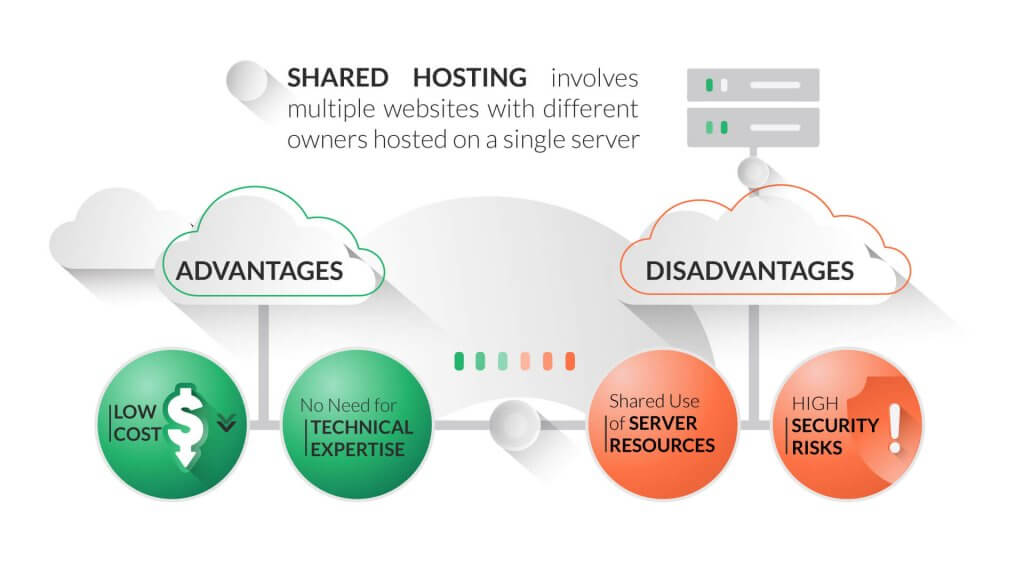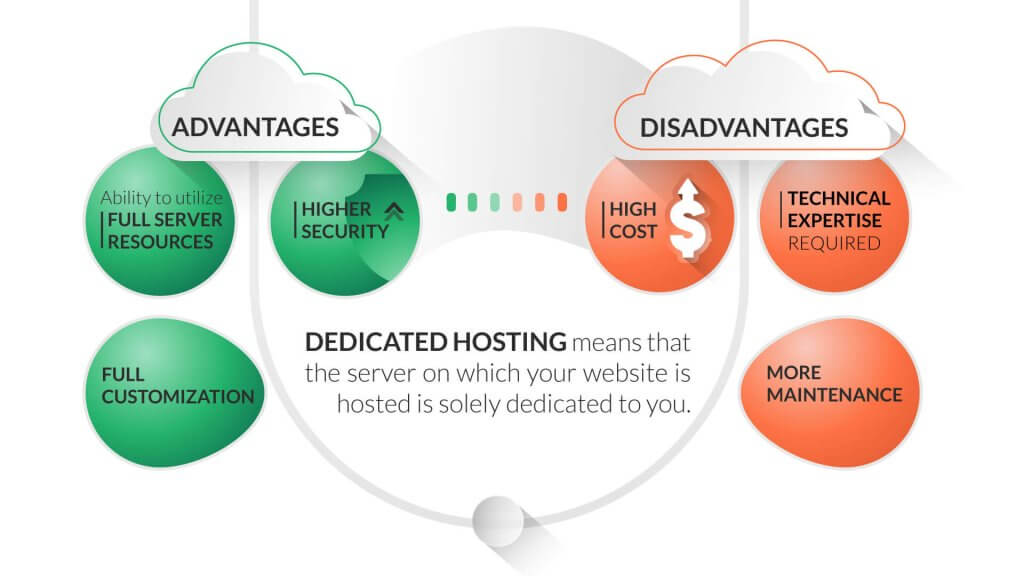For someone unfamiliar with the process of getting web hosting, understanding the distinction between each kind of hosting can be complicated.
Web hosting is a service where a website owner or developer rents space on the host’s server to build their site and put it live. It’s like a virtual rent agreement.
However, there are so many different kinds to choose from when you get web hosting that you might feel lost.
Two of the most popular types of web hosting, which are also on the opposite ends of the spectrum, are shared hosting and dedicated hosting.
To simplify things, we’ve prepared a guide for you. This article describes shared hosting and dedicated hosting in detail, along with their advantages, disadvantages, and how they’re different from one another, so you can have a better idea about which option is better suited for your website.
- What is Shared Hosting?
- Advantages of Shared Hosting
- Disadvantages of Shared Hosting
- Who Uses Shared Hosting?
- What is Dedicated Hosting?
- Advantages of Dedicated Hosting
- Disadvantages of Dedicated Hosting
- Who Uses Dedicated Hosting?
- Cost of Shared Hosting
- Cost of Dedicated Hosting
- Which Hosting Option is Right for Your Business?
Shared Hosting vs Dedicated Hosting
In both shared and dedicated web hosting, website data is held on a single bare metal server. When visitors access your website on the internet, the server makes your data available to them.
The difference is in the type of server your website is hosted on. In shared hosting, your website is placed with other websites – in other words, you have neighbouring websites using the same server as you.
On the other hand, in dedicated hosting, you have a server all to yourself – your site is the only one hosted there. Although dedicated hosting sounds like it’s more advantageous, both come with pros and cons and both are important in the web hosting world.
Shared Hosting
Let’s first discuss shared hosting, how it can help, and its drawbacks.

What is Shared Hosting?
Shared hosting involves multiple websites with different owners hosted on a single server, Since it’s cheaper than dedicated hosting and involves sharing space on the internet with other websites, some have compared shared hosting with a public bus system.
While shared hosting works just fine for many live websites out, it does have certain advantages and disadvantages.
Advantages of Shared Hosting
There are tons of benefits to shared hosting, but we’ll talk about the factors that stand out the most.
Low Cost
One of the most influencing aspects of shared hosting is its low cost. Since many websites are hosted on a single server, the website owners bear the distributed amount of the server’s maintenance cost.
While initially, you’re just paying your contribution like other websites on the server, you can pay more for extra upgrades to allow more traffic to your site and have greater use of resources.
No Need for Technical Expertise
Many people launch their website through a shared hosting server because it doesn’t require complete technical knowledge of the servers. They can just sign up for a plan and get their website hosted without any in-depth know-how.
With shared hosting, you get a control panel to manage your website and facilitate website management through pre-installed applications and programs that come with general websites.
Shared hosting providers take care of server maintenance, updating, fixing patches, and more. As a result, website owners don’t have to worry about not having the technical skills to have a perfectly running website.
Disadvantages of Shared Hosting
While there are lots of good features in shared hosting, we can’t ignore its drawbacks.
Shared Use of Server Resources
Although shared hosting is excellent for new businesses with lower traffic only conducting basic operations, it does have limitations that might make it hard for you to expand your website.
The most prominent one is the shared use of resources. The quality of the server, including processing power, disk space, memory, and other resources, are shared by thousands of websites on the same server. As a result, you can get the “bad neighbour effect,” which happens when one website hogs most of the resources, leaving other neighbours with slowed operations and high downtime.
The chances of something like this occurring are pretty low. Most hosting companies are focused on ensuring they have enough resources to accommodate everyone before taking new clients.
High Security Risks
Because shared hosting has thousands of sites on the same server, the security risks are higher. If someone on the same server is carrying out spam activities, your server’s IP address can be blacklisted, making your website vanish in seconds, leaving you clueless and at a loss.
To prevent this from happening, make sure you choose a hosting provider with strict policies against such users.
Who Uses Shared Hosting?
If you plan to launch a website for your small or midsize business with a beginner-friendly environment, shared hosting may be the right choice for you. It’s great for those who want a budget option.
If your website traffic isn’t heavy, the disadvantages of shared hosting will likely not affect your website.
In future, if your website outgrows the resources allotted to you, you can quickly go for better hosting plans. Your website will be easily migrated to a different hosting environment, which wouldn’t negatively affect your website’s quality and environment.
Dedicated Hosting
Now, let’s talk about dedicated hosting, how it can help you, and its disadvantages.

What is Dedicated Hosting?
Dedicated hosting means that the server on which your website is hosted is solely dedicated to you. You won’t have any neighbours with this type of hosting, which keeps all the competition away and only has your resources. It increases your website performance and eliminates security risks.
If shared hosting is like a public bus, dedicated hosting is like renting your own car – you have all the space to yourself.
Since you get so many benefits with dedicated hosting that you don’t get with shared, it comes at a much higher cost. It also requires more technical knowledge. You can go from one place to another on a public bus, but you need to know how to drive to rent a car to go by yourself.
Similar to shared hosting, dedicated hosting has its own set of pros and cons.
Advantages of Dedicated Hosting
Dedicated hosting has many benefits. Still, some are more highlighted than others, such as:
Ability to Utilize Full Server Resources
Dedicated hosting comes with the full ability to use all the server’s resources. There’s no one to hog the resources, which means there’s no “bad neighbour effect.” The processing power, memory, and storage are under your control.
Higher Security
Since you’re not sharing the resources, you’re the only one to exist in the environment, which means there is no one to threaten your server’s security. While there aren’t many cases of cyberattacks in shared hosting, your website is, environment-wise, much more secure in dedicated hosting.
Full Customization
Dedicated hosting comes with the ability to customize. Since you can modify the root software code, you can optimize your website by changing the server settings and code. If your website requires a particular application, the server’s configuration will be a big help.
Disadvantages of Dedicated Hosting
While dedicated hosting is a feature-packed hosting environment, it also has specific cons.
High Cost
Greater resources come at a greater price. However, the websites that opt for dedicated hosting are usually profitable enough to afford it. It’s not for newly-founded businesses.
Technical Expertise Required
Dedicated hosting requires a high level of technical knowledge, especially if you want to customize. If you’re not technically aware, you could hire a server admin or purchase a plan with additional support, but this will just add to your already high cost.
More Maintenance
Since dedicated hosting gives you full authority to control and maintain the server at your convenience and preference, it adds to your burden. You need to either be an expert and have the free time to maintain the server, upgrade it, install patches, and carry out other maintenance tasks, or you need to hire someone to do that for you.
One way to escape these technicalities is to get managed WordPress hosting. The host takes care of all the tech-savvy maintenance and controlling tasks, while the website owner focuses on growing the business.
Who Uses Dedicated Hosting?
Dedicated hosting environments are best for companies with very high bandwidth requirements who consider their website as their main source of income. If you have a large-scale business with specialized virtual needs, consider investing in dedicated hosting.
This will let you take care of valuable customer data with a high level of security. However, you need to ensure that you can continue affording this hosting environment in the long term. If you’re tech-savvy and can capitalize on your skill through customization, dedicated hosting might be right up your alley.
Shared Hosting vs Dedicated Hosting – Comparison
Here’s an outline of how shared hosting and dedicated hosting compare.
Reliability
If you’re looking for reliability, then, without a doubt, dedicated hosting is the way to go. Shared hosting’s potential downtimes due to bad neighbours can harm your traffic. However, do you need reliability so badly that you’re willing to pay a much higher cost for it?
If you have a large volume of traffic and your website always needs to be up to make you profit, then yes, reliability is something that you cannot compromise on. But shared hosting is fine if you have a new business where your website isn’t doing all of the work.
Security
As we’ve said, shared hosting tends to be more susceptible to cyberattacks than dedicated hosting. That’s because shared hosting is an environment where hundreds or even thousands of websites are hosted on the same server, so any nefarious activity on one website can affect the rest of the websites, too, such as security breaches and spam.
Scalability
Scalability refers to the amount of data and traffic between your website and the users. While dedicated hosting is entirely scalable (which means the activity you conduct on your website is not limited), things are not the same with shared hosting.
Some shared hosting providers offer scalability, and some don’t; it depends on the provider. Lately, many hosting providers are offering shared hosting with scalable bandwidth, allowing websites to get as much traffic as they can attract. In other words, scalability depends on the hosting provider you choose.
Shared Hosting Price
Shared hosting is a clear winner when it comes to price. Shared hosting costs around $1 to $20 per month, depending on what features you get and your hosting provider. If you need certain upgrades or customization in shared hosting, you’ll have to pay additional fees.
Dedicated Hosting Price
Dedicated hosting is the pricier kind of hosting environment. Depending on the plan, it starts somewhere around $60 and goes up to $350 per month. If you need something done on the backend or solve a technical problem, the host will charge additional costs.
Technical Knowledge Requirements
Shared hosting is beginner-friendly and easy to use. It doesn’t open many options to you, which means your work is small and straightforward, and the host takes care of the rest. Maintenance, controls, and upgrades are done by the host because you’re not the only website on the server.
On the other hand, dedicated hosting gives you complete freedom and power. You can’t enjoy this power if you don’t have enough knowledge. Major advantages of dedicated hosting rely on how well you administratively implement them. If you lack technical know-how, dedicated hosting is useless.
Which Hosting Option is Right for Your Business?
The answer to whether shared hosting or dedicated hosting is right for you lies in the kind of business you’re running. If you have a business that solely relies on your website, requiring high bandwidth, excellent memory, great processing power, and full control and customization abilities, then dedicated hosting is the only option for you. And with a business that extensive, you surely can afford it.
On the other hand, if you have a new or small or medium-sized business with no extensive virtual platform needs, such as processing power or memory, you can save your time and money and go with shared hosting. If you choose the right hosting provider, things can get even more secure and simple for you in shared hosting. And if you are not sure about where your website lies, you should go for managed WordPress hosting and let the host take care of everything for you.
We hope we’ve helped you understand the difference between shared and dedicated hosting. If you’re ready to make a selection, contact HostPapa, and we can guide you through the process.




